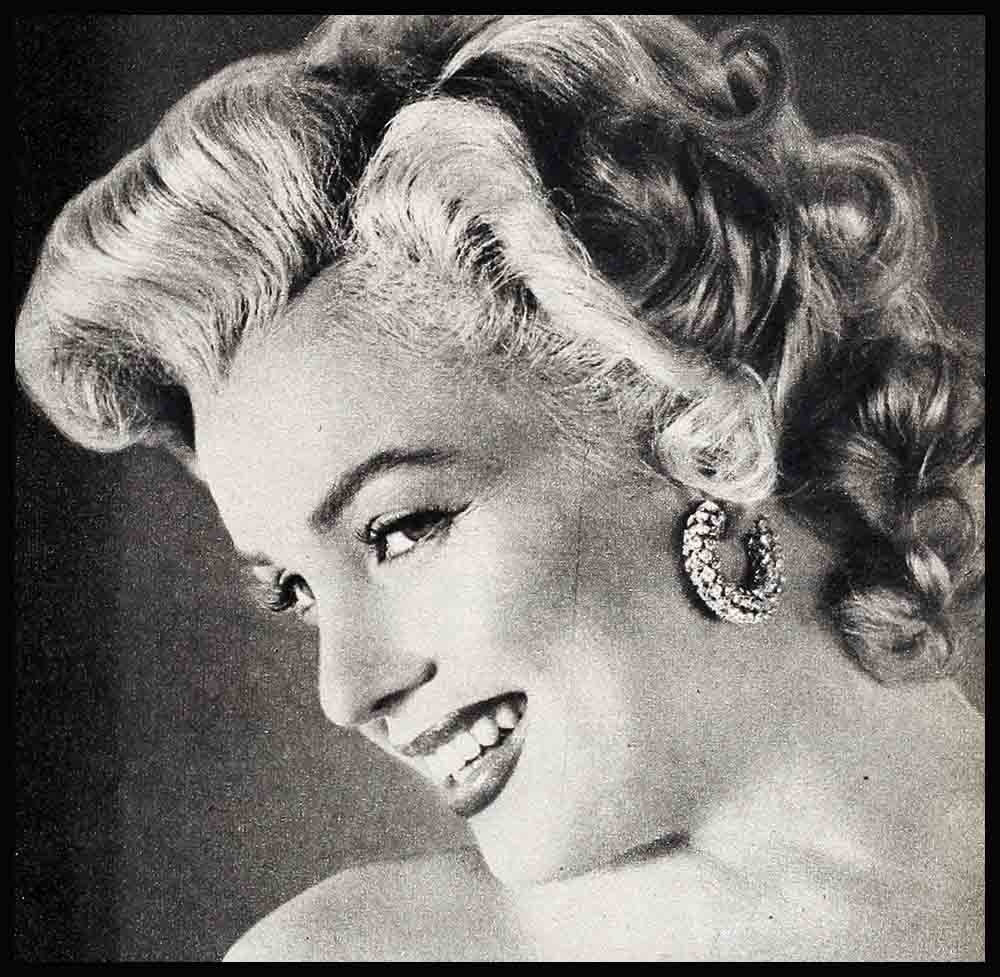
Why Gentlemen Prefer Blondes
It was a jealous brunette who invented the lie that blondes are dumb and that’s why gentlemen prefer them. I never met a blonde who wasn’t smart—especially in Hollywood where it’s the blondes who steal most of the headlines.
There always seems to be something newsworthy happening to gals like Marilyn Monroe, Virginia Mayo, Doris Day, Zsa Zsa Gabor, Betty Hutton, Shelley Winters and June Allyson, to name just a few of the more formidable fair-haired types. And if things don’t happen in the natural order of events, these gals are smart enough to cook something up that will keep them hot and sizzling in the public eye.
AUDIO BOOK
Take, for instance, Marilyn Monroe, who has drawn a lot of criticism for her antics lately, and who keeps on doing what she thinks is right for Marilyn, no matter what people say. One such “I’ll play it my way, thank you” incident took place at the annual photoplay Gold Medal Dinner. That night Darryl Zanuck tapped his foot impatiently, glared at his wristwatch, and finally—good and irritated—walked to the raised dais in the Crystal Room of the Beverly Hills Hotel and sat down. Every seat for the jam-packed dinner was now occupied—except one—Marilyn Monroe’s, next to Zanuck.
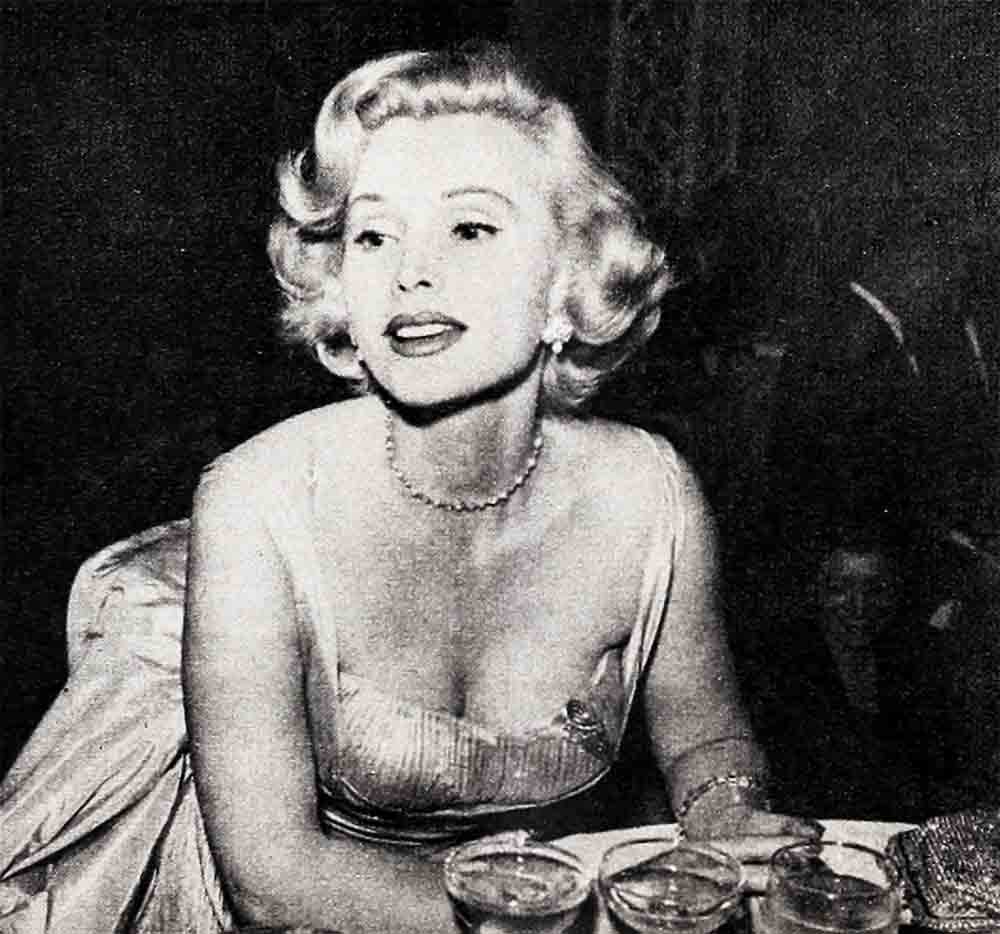
She was a full hour and a half late when she finally wriggled in, wearing the tightest of tight gold dresses. While everyone watched, the blonde swayed sinuously down the long room to her place on the dais. She had stopped the show cold. Who could ask for anything more?
Two years ago, if anyone had told Marilyn she’d keep Darryl Zanuck waiting ninety minutes for his dinner while she was sewn into her dress to attend an important party, I don’t believe that even the blonde atom would have believed it. For in her early Hollywood days, she was just one more pretty face that had been left on the cutting-room floor. And though a lot of people had her tagged as dumb, she knew enough to learn to use what heaven had seen fit to give her.
She actually did read books, and she worked with a drama coach, who taught her to act. No one, however, had to teach her to dress—or rather, undress. And despite the cries of, “It was all a publicity plant,” nobody had anything to do with that famous calendar story except Marilyn herself, either.
When her studio bosses first heard of the nude posing, they cautioned Marilyn to keep quiet. Libel laws being what they are, they knew that, so long as Marilyn didn’t admit she had posed for the photo, reporters would have thought twice before identifying her as the girl in the birthday suit. But—“I had to tell the truth,” says Marilyn, half closing her big, beautiful blue eyes, “I just had to. . .”
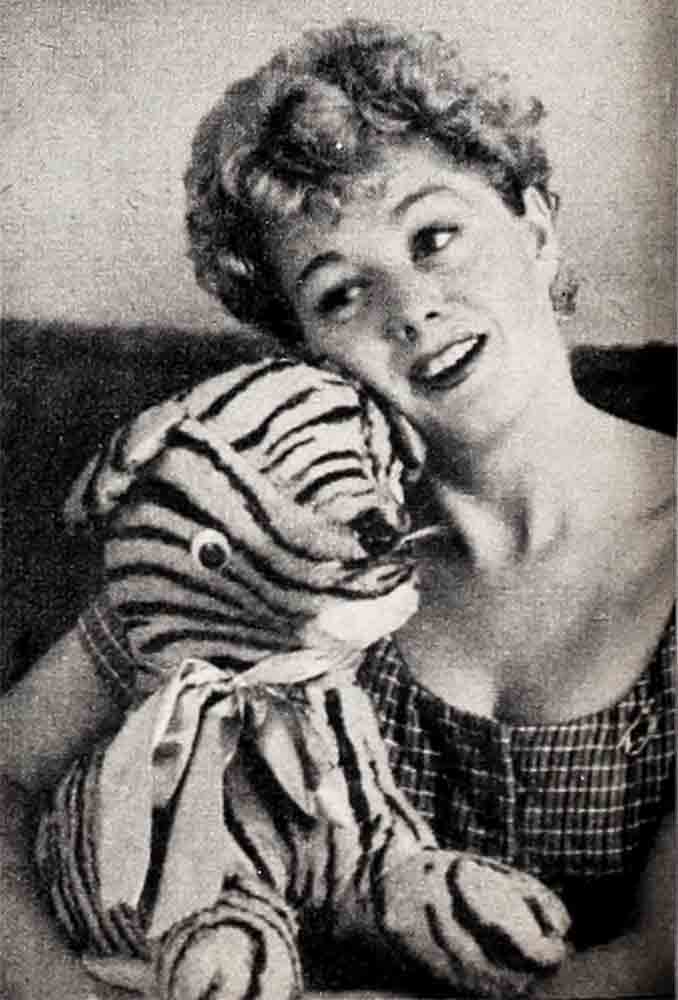
The publicity hasn’t hurt her yet. Neither have the much-quoted witticisms that flow from her rose-bud lips. Like the time she came face to face with a very bitter, very homely femme reporter who has never stopped taking cracks at Marilyn. Everyone expected the fur to fly. But the star was gracious. “How come?” she was needled. “I thought you’d skin her alive.” “It was more cruel,” meowed Marilyn, “to leave her skin as it is.” Wow!
The wisecracks, the cleavage, the never being on time (the studio actually has to employ a maid just to awaken Marilyn in the morning!) didn’t just happen accidentally. It’s all been carefully planned and expertly executed to make Marilyn what she is today—the most exciting star in Hollywood. If people talk, who cares? Not Marilyn. Not while she’s riding so high, at least.
There’s always some kind of talk making the rounds about somebody, anyway.
Right now, it’s not only fashionable to criticize Marilyn, but it’s definitely the mode to purse up your lips, shake your head in a melancholy manner, and murmur, “Poor Shelley Winters.” Stuff and nonsense! This blonde got everything she ever set out for—a career, a husband and a baby. And what’s wrong with that?
Like the Monroe, Shelley was around for a while before she made a ripple on the Hollywood pond. Then she got wise. She dropped the ingenue pose and let us have it—smack on the typewriter.
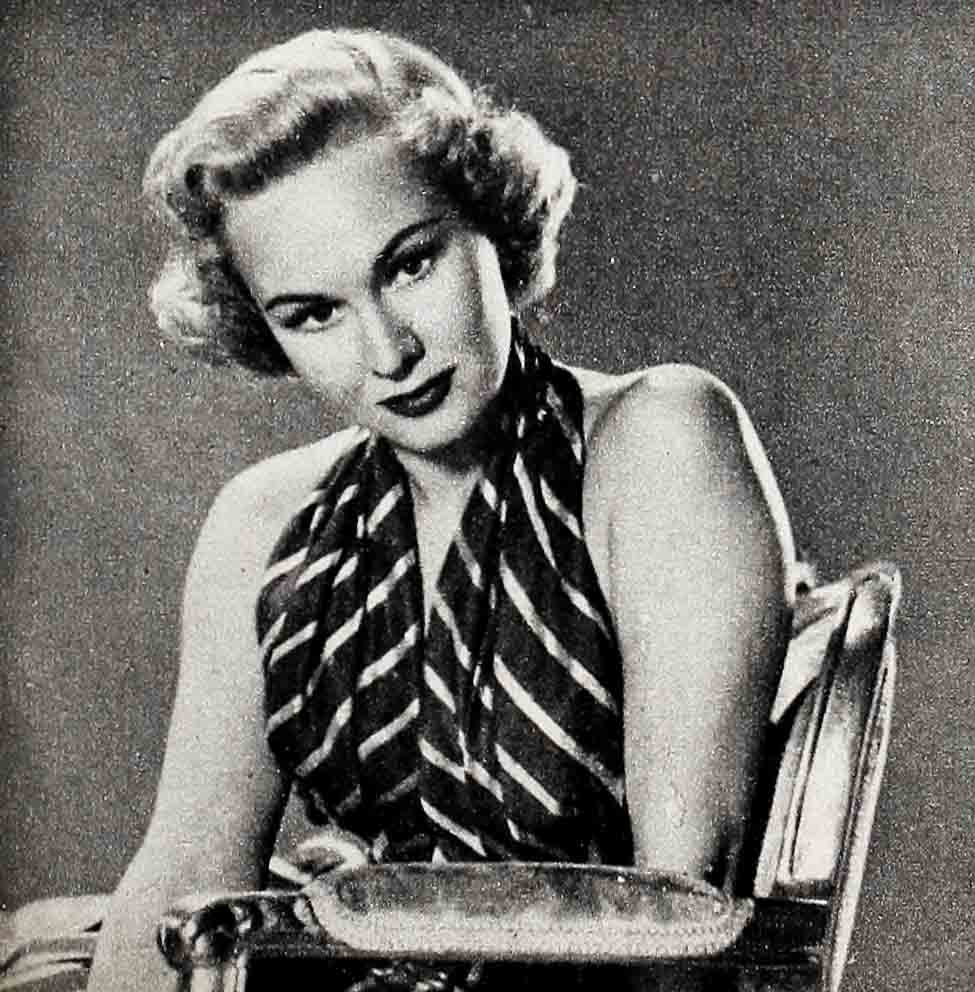
Shelley isn’t pretty, although she has a definite and unique kind of appeal. When she was expecting the baby, she let herself go in appearance as completely as a woman could—and still vaguely look like one. But everything Shelley does gets into the papers and keeps the fire burning on the career front. And right now she’s planning to give the press plenty to keep it busy—a remodeled Shelley, sleek and glamorous. And when the surprise of a chic Shelley wears off, there’ll be something else. She’s a smart cookie. She has to be—still to be on top despite all the people who don’t like her.
However, the real test of Shelley’s IQ won’t come until after she’s resumed her married life with Vittorio Gassman for a while. She wasn’t too smart before he left for Italy, but she was pregnant, and unhappy not to be going with him, which explains why she emptied that glass of water in his lap when she thought he paid too much attention to Zsa Zsa Gabor. But now it’ll be man-to-woman stuff. Don’t muff it, Shell!
Talking of Zsa Zsa, this blonde by choice—she wasn’t particularly pretty before she lightened her hair—is a fantastic example of what egocentricity and one of the ten sharpest brains in the business can do for a girl. I’ll never know how she persuaded John Huston to let her play Jane Avril in “Moulin Rouge.” True, the money man, Jimmy Woolf, insisted, but Huston has never been pushed into a casting he doesn’t approve of. So what happens? Zsa Zsa spends every cent of the $6,000 salary in drammer lessons from Constance Collier, who coached Hepburn. But it was her beauty that stole the picture for me, not her acting.
She’s made the covers of many a magazine—you name it—Zsa Zsa’s been on it. Her wisecracks are quoted ali over the world. Her glamour is a byword in London and Paris where they qualify every woman with “She’s not as attractive as Zsa Zsa.” George Sanders apparently can’t live with her, or without her. I believe she loves him or she couldn’t put up with his rudeness. And let’s face it, she gave up $36,000 a year from Conrad Hilton to marry the man. My hat’s off to you Zsa Zsa. You’ve proved anything’s possible.
And, in her way, so has Virginia Mayo. The Mayo gal, born plain Virginia Jones on the wrong side of the tracks, has little in the way of social graces—no small talk, no natural sophistication. She’s through after she says hello. But never underestimate her brain appeal. When she was under contract to Goldwyn, he’d bawl her out twice a week. “You can’t walk, you can’t talk, you can’t dress,” Sam screamed. He hired people to teach her to walk and talk and dress. Then he hollered at them, “What are you trying to do, make a Bergman of her?”
“Why do you take it?” one of those friends who specialize in trouble-making asked. “He’s the head of the studio. He must know what he’s talking about,” Ginny replied sweetly.
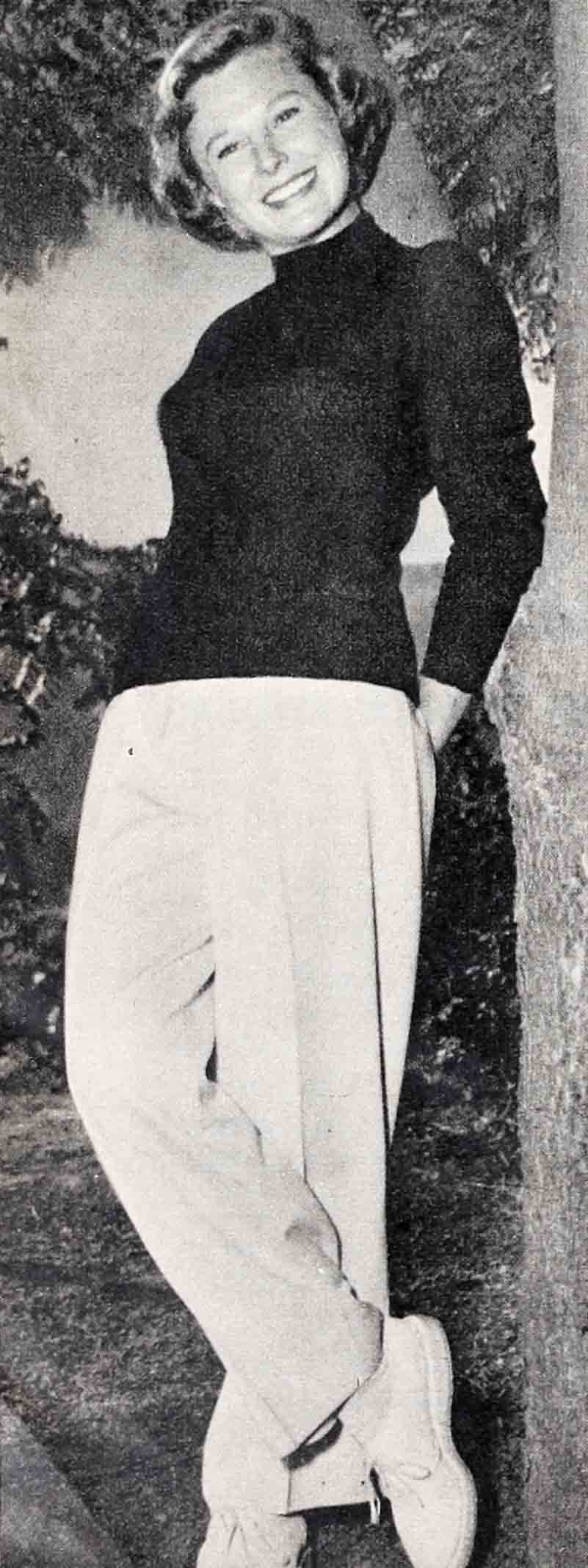
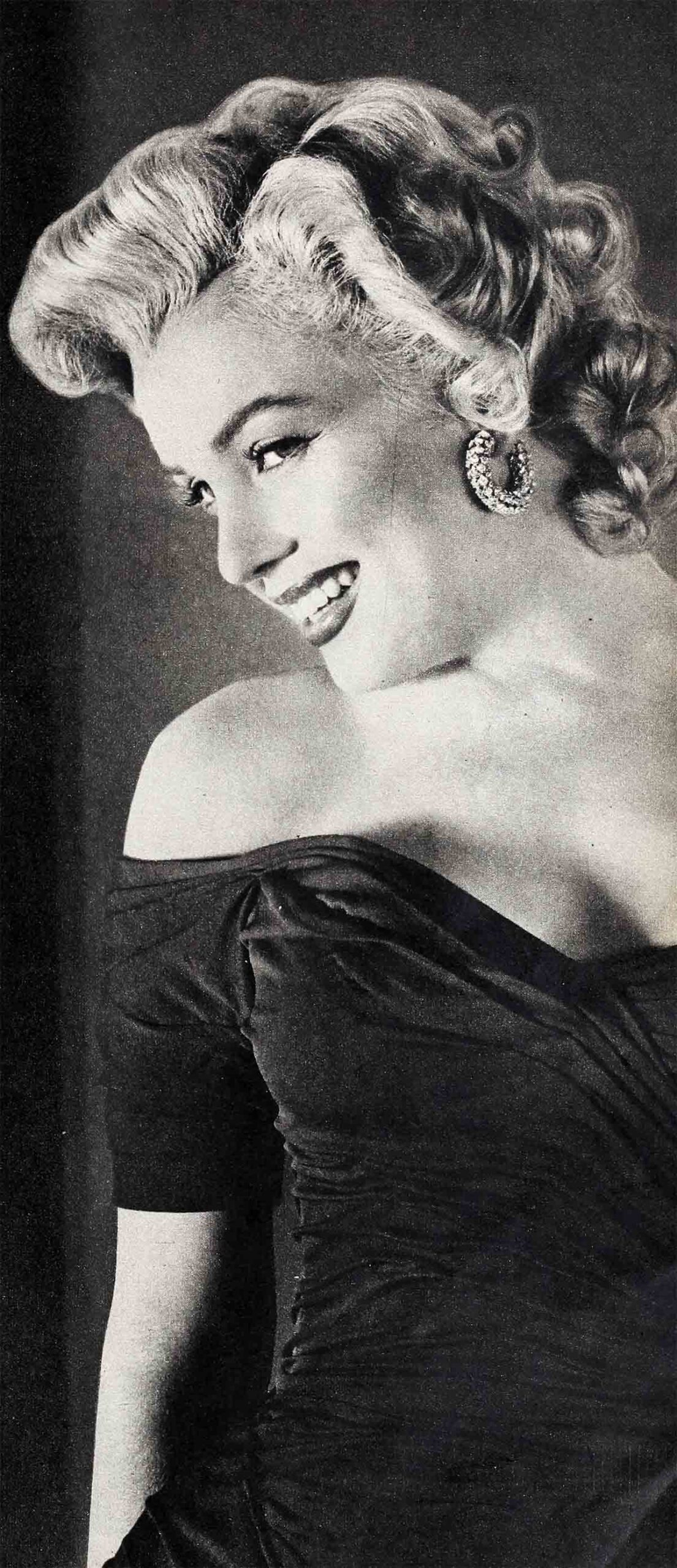
M-m Monroe—excitement as planned
She hated stooging for Danny Kaye, but no one knew it until she left Goldwyn. And when Danny, who used to humiliate her in their pictures for Sam, followed her to Warners for “Inspector General”—the biggest flop of his career, by the way—Virginia, one of the biggest stars on the lot, was gracious and pleasant to her ex-tormentor, when she had every justification for being real witchy. That’s what I call smart.
But the smartest thing she ever did was to marry Mike O’Shea, some years her senior. He cracks the whip the way she used to crack it with her two-man Pansy, the Horse act. Mike makes her go out when she’d rather stay home on the ranch. He fronts for her in conversation. He supplies a much-needed sense of humor. He makes every decision.
When Ginny did a big fashion sitting for photoplay in New York recently, he-man O’Shea was on hand to arrange every fold of every dress.
They love Virginia at the studio because she does anything they tell her. She’s smart in knowing she isn’t a great talent. But she’s working all the time. It’s almost a joke because she’s in every picture. Even in lay-off time when other stars yell blue murder if the studio wants them for anything, Virginia comes into the publicity department and says, ‘I’ll do all the publicity you want.” And signs the Screen Actors Guild release.
Virginia makes around $3,500 weekly and Mike socks most of it away. They’ll be rich when she retires. And don’t get him wrong. No one would dare to call him Mr. Virginia Mayo. He works—radio, pictures now and then, also legit plays. But his hundred per cent interest in life is his beautiful blonde bride. And how many wives can say that of their husbands?
Two other top movie stars can—Betty Hutton and Doris Day. Both were married before, but it didn’t work out because the husbands had other interests and were disinclined to put all of their eggs into one blonde basket. But even though Hutton’s hubby, Charlie O’Curran, is officially listed as a dance director, and Doris’ dream boy, Marty Melcher, is an agent, each gal is Number One project for both.
Everyone agrees that Hutton is a babe with a brain. But only time can tell whether O’Curran was smart to pull out of Paramount when he was pulling down $1,000 per week, to hitch his future to Betty’s star. Her motives were noble. But it’s still too early to guess at the final results.
In the meantime, Mr. and Mrs. O’Curran are touring. But they have a beautiful home here, and the question is—how long can Betty keep traveling without coming home to make some pictures, which is a must if she is to maintain her appeal on the road. Well, Betty’s a girl who usually gets what she wants, so I’ll bet she’ll persuade someone to take a chance with her Charlie.
Or they’ll do a TV series together. Because Betty is a smart blonde and she knows it’s more important to have a happy marriage than to get all the backing for all the pictures in the world, if that means being parted from her husband. A smart redhead showed it could be done—and I do mean Lucille Ball.
Whatever they do, Betty’s bank account has benefited since her marriage. Before she and Charlie left Paramount, she was keeping only six cents out of each dollar of her fabulous income. Now with her Capital gains set up with Charlie’s, twenty-eight cents out of every dollar sticks in the kitty. They don’t give parties, they don’t buy extravagant furs and jewels—except for the act. And they’re happy.
Doris Day is something else. Like Betty, she wants her husband, Marty Melcher, giving himself to her in the daytime, nighttime and work-time. And there was well-founded talk that she wouldn’t re-sign with Warners unless they signed Marty to a producer’s contract. But there are more ways of directing a wife’s career than by signing on the dotted line. Marty can do as much for Doris behind his agent’s desk as he can producing her pictures—maybe more—which is perhaps why Doris decided not to pursue the point. As producer, he’d be answerable to Jack Warner. As Miss Day’s agent, Mr. Warner has to answer to him.
Doris isn’t too popular at Warners, to judge by the tales told you out of school. Neither was Hutton at Paramount. Strong-minded females are seldom popular. But the stories of their temperament usually seem to be hoked-up exaggerations. And there are always plenty of pleasant tales to disprove all those with claws in them. As witness this, from photographer Hymie Fink: He was due to do a lay-out of Doris and her husband at the studio, and Marty went there especially for it. At the last minute, Hymie couldn’t make it. Most stars would say “Too bad,” and delightedly let it go at that. But Doris insisted that Marty come in again the next day so that Hymie could take his photos. P.S. Smart girls are always good to photographers. They know those shutter-clickers can murder them if they’re not.
But the smartest living blonde in Hollywood is June Allyson. She always gives the impression she’s about to crochet an antimacassar. Don’t be fooled. It might be your strait jacket. When she crinkles up her nose and giggles, you’d better cry Uncle and give in—because she’s gonna get what she’s after. Enough said!
Reviewing the blonde bangtails, perhaps the smartest we ever had here was Carole Lombard. Sleek, chic and brilliant. She could lunch with a Queen and take tea with a chambermaid. Men found her fun. Women copied her clothes and mannerisms. Jean Harlow did all right too. And today’s crop of smart blondes seem to have picked up a lot of tricks from their predecessors—and added a few clever gimmicks of their own.
THE END
It is a quote. PHOTOPLAY MAGAZINE JUNE 1953
AUDIO BOOK


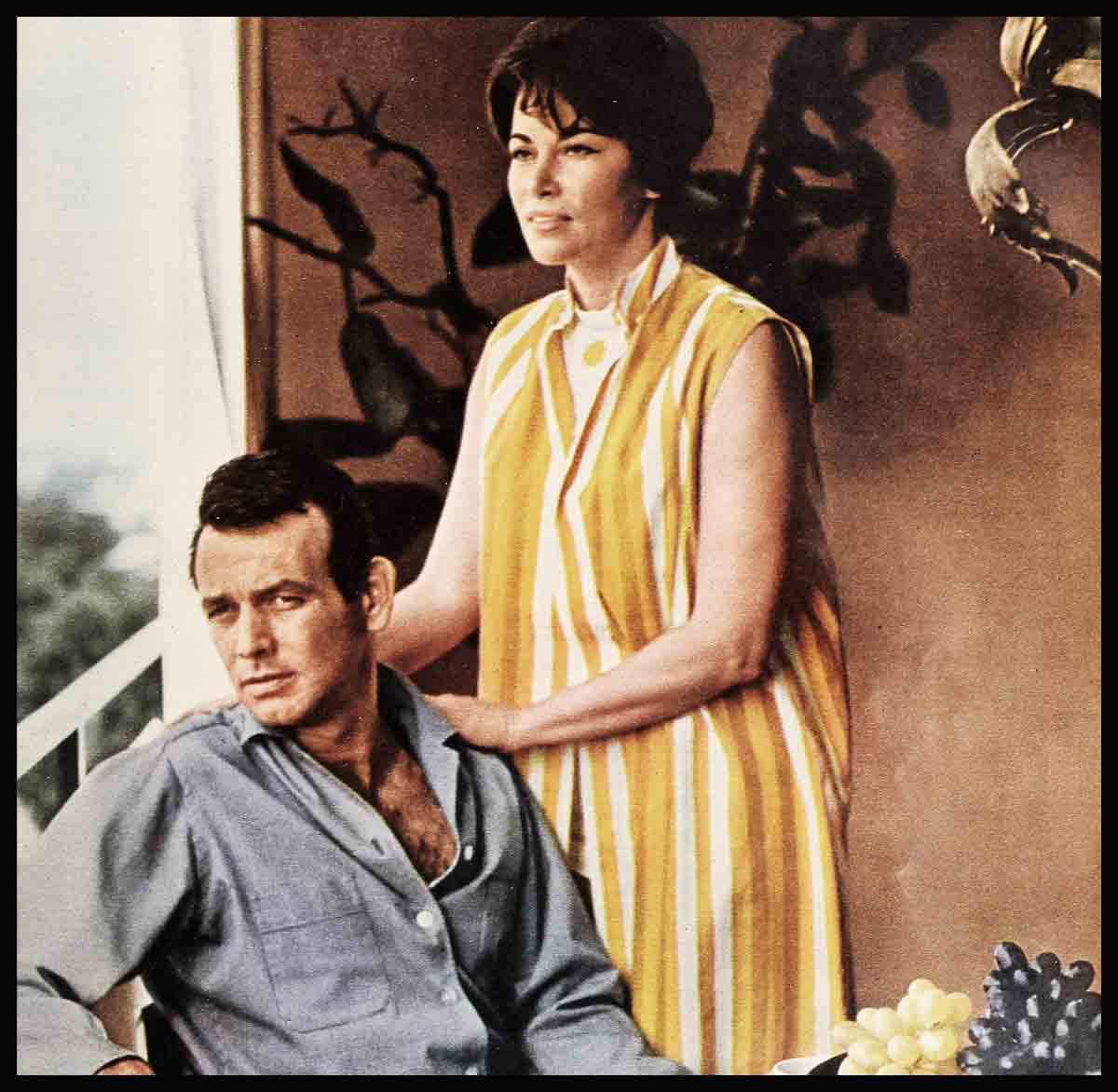

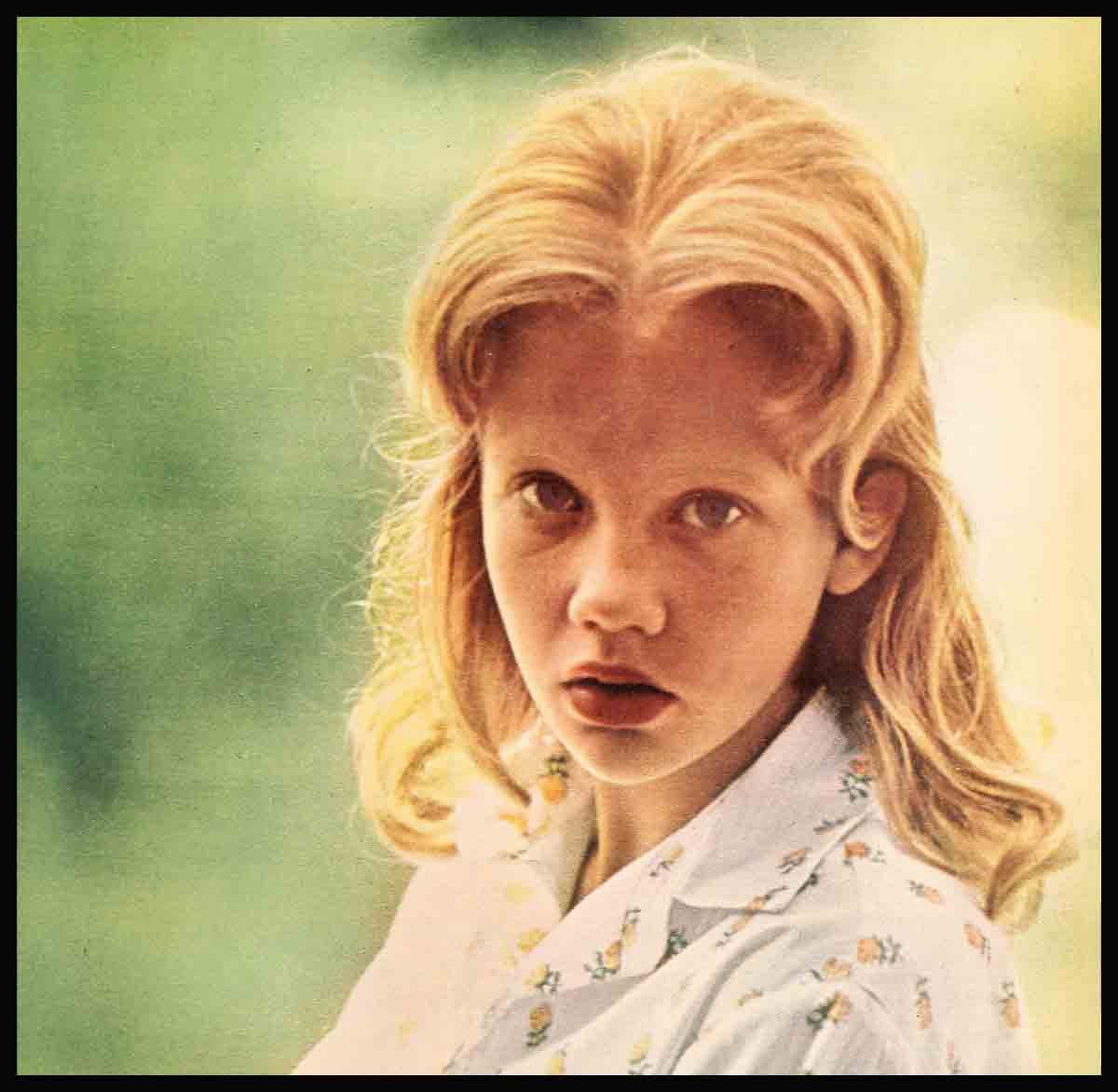
No Comments